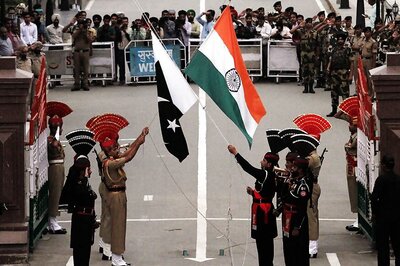
views
Dubai: Suspected attacks left two tankers ablaze in the waters of the Gulf of Oman on Thursday, sparking fears of a broader conflict and sending world oil prices soaring. The mysterious incident came amid spiralling tensions between Iran and the US, which pointed the finger at the Islamic republic last month over similar attacks in the strategic sea lane.
The UN Security Council is to hold a closed-door meeting later on Thursday at the request of the United States to discuss the suspected attacks.
The Norwegian Maritime Authority said three explosions were reported on board the Norwegian-owned tanker Front Altair after it was "attacked" along with the Japanese-owned Kokuka Courageous.
Iran said its navy rescued 44 crew members after the two vessels, which were carrying highly inflammable material, caught fire. Footage aired on television showed thick, black plumes of smoke and flames billowing from one of the tankers as it lay out to sea.
Iranian Foreign Minister Mohammad Javad Zarif said the timing of the "reported attacks" was "suspicious", coming as Japan's prime minister held talks in Iran.
The US Fifth Fleet, based in the Gulf kingdom of Bahrain, said its warships had received separate distress calls from each vessel.
The White House said US President Donald Trump was briefed on the suspected attacks and the government was assessing the situation.
‘Security incident’
UN chief Antonio Guterres condemned the "security incidents" and warned the world cannot afford a major confrontation in the Gulf, while the European Union called for "maximum restraint".
State media in Iran said the incidents happened one hour apart in the early morning.
The Front Altair, a 111,000-tonne vessel carrying ethanol from Qatar to Taiwan, caught fire first off Bandar-e-Jask in southern Iran, the official IRNA news agency said. "As the ship caught fire, 23 of the crew jumped into the water and were saved by a passing ship and handed over to the Iranian rescue unit," it said.
Robert Hvide Macleo, chief executive for the ship's owner Frontline, wrote in a text message to AFP: "I can confirm that the vessel has NOT sunk" and the crew were "all safe".
The Kokuka Courageous was headed to Singapore from Saudi Arabia with a cargo of methanol, IRNA said.
Singapore-based BSM Ship Management said it had "launched a full-scale emergency response following a security incident" involving the Kokuka. "The 21 crew of the vessel abandoned ship after the incident on board which resulted in damage to the ship's hull starboard side," it said of the vessel owned by Japanese company Kokuka Sangyo Ltd. "One crew man from the Kokuka Courageous was slightly injured... and is receiving first aid."
In Tokyo, Japan's Economy, Trade and Industry Minister Hiroshige Seko said, "A tanker carrying Japan-related goods was attacked. There were no injuries among the crew members. They got off the tanker. There were no Japanese members."
Front Altair was reportedly still burning late Thursday, but the fire aboard the Kokuka Courageous was under control extinguished, said an Iranian official involved in the rescue operation.
The incident came as Japanese Prime Minister Shinzo Abe was on an unprecedented visit to Iran, seeking to defuse tensions between Tokyo's ally Washington and the Islamic republic.
Oil price spike
World oil prices surged following reports of the suspected attacks, exacerbating tensions in the crude-rich Middle East, analysts said.
"Tension across the Middle East is high — and the attacks on two tankers has further exacerbated the situation, even though there does not appear to have been any damage to the cargos," said John Hall, chairman of British-based consultancy Alfa Energy.
London's Brent North Sea oil jumped more than four percent in morning deals before trimming gains.
In afternoon trading, Brent for August delivery stood at $61.99 (around Rs 4,300) per barrel, up $2.02 (around Rs 140), or nearly 3.4% from Wednesday.
New York's West Texas Intermediate was up $1.60 (around Rs 111) or around 3.1% at $52.74 (around Rs 3,600) per barrel.
The Gulf of Oman lies at the other end of the strategic Strait of Hormuz from the Gulf, part of a vital chokepoint through which at least 15 million barrels of crude oil and hundreds of millions of dollars of non-oil imports pass.
On May 12, four oil tankers — two Saudi, one Norwegian and one Emirati — were damaged in still unexplained attacks off the port of Fujairah in the United Arab Emirates.
US national security adviser John Bolton said Iranian naval mines were almost certainly behind those attacks without providing any evidence.
The UAE said initial findings of a five-nation investigation delivered to the UN pointed to the likelihood a state was involved.
King Salman of Saudi Arabia warned this month that "terrorist" attacks in the Gulf could imperil global oil supplies, as he sought to galvanise support against arch-rival Iran. The kingdom, the world's top oil exporter, ratcheted up tensions with Iran after the attacks off Fujairah, which were followed by a drone strike on a key Saudi oil pipeline claimed by Yemen's Iran-aligned Huthi rebels.
"We are in a dangerous moment in the region with this emerging pattern of attacks," said Elizabeth Dickinson, senior analyst with International Crisis Group. "Any miscalculation or misunderstanding risks a spiral toward more direct confrontation."



















Comments
0 comment